On this day, 6 June, 75 years ago the Normandy landings took place. This was part of a major combined naval, air and land assault on German-occupied France by Allied forces, codenamed Operation ‘Overlord’. The D-Day landings saw around 150,000 Allied troops land on French soil but it was just the start of a much longer operation to liberate France. In this week’s blog post I have pulled together just a small selection of our digital library resources that will help you explore the Normandy landings, the events leading up to it and the aftermath. And you can use many of these to find out more about the many other events happening around this time that contributed to the end of the Second World War.
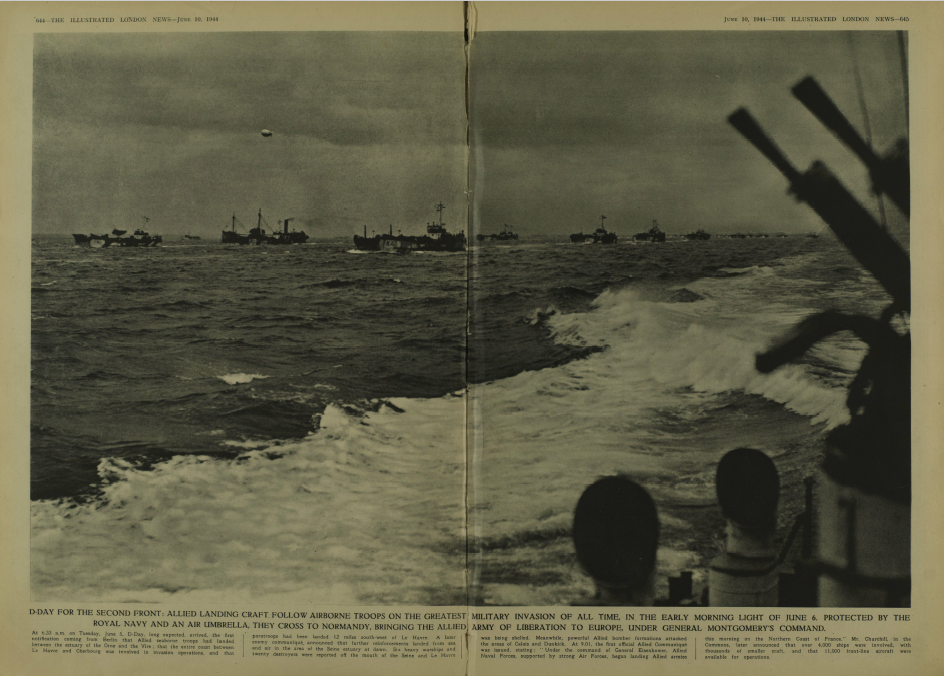
D-Day For the Second Front, ‘Illustrated London News’, Saturday 10 June 1944, pp. 644-645. From Illustrated London News Archive.
What did the papers say?
Operation Overlord was top secret, so it wasn’t until the 6th June that news of the invasion began to filter through. Reports of the Normandy landings does appear in some late editions of newspapers from that day but it is mostly covered in issues published the next day, 7th June, or on next subsequent publication date.
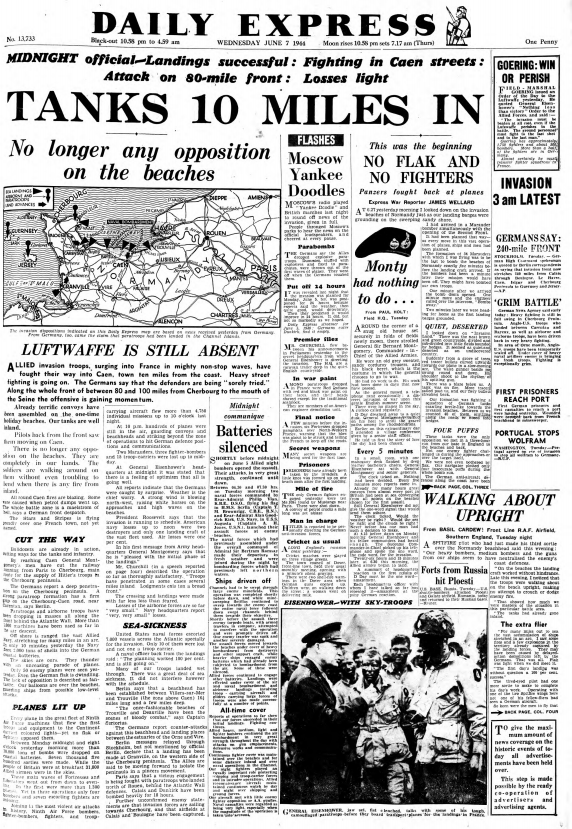
Front page of the ‘Daily Express’, Wednesday 7 June 1944. From UK Press Online.
The Library subscribes to a large number of digitised newspaper archives that will allow you to see what events were being reported on at the time and how they were being reported. Read full text articles, compare how different newspapers were covering the same issues and stories and track coverage of Operation Overlord from the Normandy landings onwards.
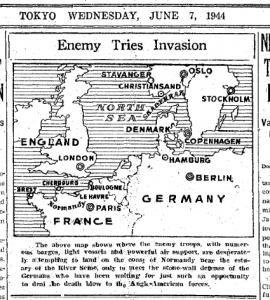
From front page of ‘Japan Times’ (‘Nippon Times’), Wednesday 7 June 1944. From the Japan Times Archives.
You can search individual titles, such as The Times, The Scotsman, The Guardian and The Observer, The Daily Mail, The New York Times, The Washington Post, New York Amsterdam News, The Irish Times, Pravda, The Times of India, Japan Times, etc. Or you can cross-search a range of titles, through databases such as UK Press Online (includes Daily Express, Daily Mirror, Daily Worker, etc.,), British Library Newspapers (includes national and regional newspaper titles), Irish Newspaper Archive (the largest online database of Irish newspapers in the world), Chinese Newspaper Collection (includes around a dozen English language newspapers published in China), etc.
Service Newspapers of World War Two
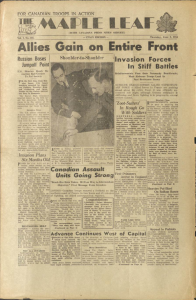
Front page of ‘The Maple Leaf’, Thursday 8 June 1944. From Service Newspapers of World War Two.
The Library also has access to Service Newspapers of World War Two which contains an extensive range of digitised rare (and well-known) wartime publications for soliders serving in major theatres around the world. Publications are included from many key nations involved in the conflict from around the world and both Allied and Axis publications are included, offering a broad view of the war and the experiences of those on the front lines.
All digitised newspaper and periodicals/magazines archives available via the Library can be accessed from the Newspapers & Magazines database list .
What do the archives tell us?
The Library has access to a large range of primary source databases that allow you to search for and view digitised primary source material from libraries, archives and museums across the world.
 For official documents relating to Operation Overlord why not take a look at Allied Propaganda in World War II and the British Political Warfare Executive, British Foreign Office: United States Correspondence or Conditions and Politics in Occupied Western Europe 1940-45 (all available via Archives Unbound)? And the Churchill Archive is a fantastic resource for this topic and anything related to World War Two. It includes more than 800,000 pages of original documents, produced between 1874 and 1965, ranging from Winston S. Churchill’s personal correspondence to his official exchanges with kings, presidents, politicians, and military leaders.
For official documents relating to Operation Overlord why not take a look at Allied Propaganda in World War II and the British Political Warfare Executive, British Foreign Office: United States Correspondence or Conditions and Politics in Occupied Western Europe 1940-45 (all available via Archives Unbound)? And the Churchill Archive is a fantastic resource for this topic and anything related to World War Two. It includes more than 800,000 pages of original documents, produced between 1874 and 1965, ranging from Winston S. Churchill’s personal correspondence to his official exchanges with kings, presidents, politicians, and military leaders.
Interested in something other than the official documents and journalist reports? Then Mass Observation Online may be what you are looking for? This superb resource gives you access to one of the most important archives for the study of Social History in the modern era, that studied the everyday lives of ordinary people in Britain (from 1937 until the early 1950s). This digital archive includes original manuscript and typescript papers (such as diaries, day reports, questionnaires, observations, etc.) created and collected by the Mass Observation organisation, as well as printed publications, photographs and some interactive features.

As you can imagine this is a particularly rich resource for looking at the lives of ordinary Britons during the Second World War. It captures the juxtaposition of people living through these momentous events all the while getting on with their normal lives. As Diarist 5457 shows when on the 6th June she talks with excitement about the liberation of Rome and D-Day then on the 7th June immediately launches into the fact she has to remember to leave work early that day for a dentist appointment (to be fair, she was recovering from just having 17 teeth extracted!!)
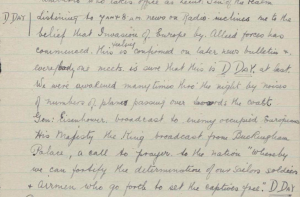
Extract from 6th June 1944. Diarist 5457, December 1943 – July 1944, © Mass Observation Archive. University of Sussex Special Collections
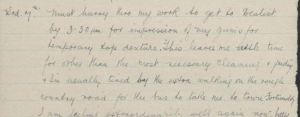
Extract from 7th June 1944. Diarist 5457, December 1943 – July 1944, © Mass Observation Archive. University of Sussex Special Collections
Life goes on. And in fact the diarist feels guilty about writing about the war so much.
I feel that I should not fill my diary with war news in this way but really these times are so exciting & so full of history making, but for the loss of life which is deplorable but which is War, it is a wonderful time to have lived in. [1]
You can access these and a large range of other primary source resources from Primary source databases.
What research has been done already?
You can use bibliographic (abstracting and indexing) databases to search for journal articles, book chapters, book reviews, conference reports, theses, etc. This enables you to find scholarly research on the Normandy landings and all events surrounding it.
Historical Abstracts would be a good database to start with for this area of research. Historical Abstracts provides a bibliographic reference to the history of the world (excluding United States and Canada) focusing on the 15th century forward. The database covers over 2,600 journals published worldwide, providing an incomparable research tool for students and researchers of world history. The database provides indexing of historical articles in over 40 languages, published from 1955.

There are other bibliographic databases that would also be useful for this area of research e.g. America: History & Life, Arts & Humanities Citation Index, Bibliography of British and Irish History, JSTOR, etc. Take a look at the databases listed under History for more information. Why not also search DiscoverEd to see what books, articles and other material you can find in the Library related to the Normandy landings.
What to watch?
You can use some of the Library’s moving image and video streaming databases to search for and view films, documentaries, interviews, plays, TV programmes, etc., on the Normandy landings. And as you can imagine there is a lot out there.

Box of Broadcasts (BoB) allows you to view or listen to previously recorded TV and radio programmes from over 60 stations, you can also record programmes yourself, create clips and create playlists. From documentaries such as D-Day: Turning the Tide, D-Day: As It Happens, The Light of Dawn: The Normandy Landings, We Fought on D-Day, Guy Martin’s D-Day Landing, Bloody Omaha: Timewatch, The Secret D-Day Disaster: Revealed, If I Don’t Come Home – Letters from D-Day to films and dramas such as The Longest Day, Saving Private Ryan, Overlord, Band of Brothers and Storming Juno.

Academic Video Online is a multidisciplinary collection of videos that allows you to analyse unique and valuable content from over 500 producers and distributors around the world. With 1000s of videos already available on the site, around 400 new titles are added to the site every month. The site is easy to search and browse and while it does include TV programmes and films from the U.K. it has more (than BoB) from the perspectives of Britain’s allies, particularly the United States including documentaries such as D-Day: The Total Story, Big Picture: D-Day Convoy to Normandy, Military History, Day of Days: June 6, 1944 – American Soldier’s Remember D-Day, Franklin Roosevelt on D-Day, 1944, as well as news reports from the time via United News newsreels.
You can access BoB, Academic Video Online and other video streaming and moving image databases from Image and moving image databases.
Other resources
While the majority of digital resources mentioned are only accessible to staff and students at the University there are a range of open access digital resources available to all. Here are just a small selection of sites that may lead you to more digitised primary sources:
- What Was D-Day? (from the Imperial War Museums)
- World War II: D-Day, The Invasion of Normandy (from Eisenhower Presidential Library, Museum & Boyhood Home)
- The Cabinet Papers (from the National Archives)
- D-Day and the Normandy Invasion (from Google Arts and Culture)
- British Battles: D-Day, 1944 (from the National Archives)
- D-Day Reports (from BBC Radio 4)
- D-Day (from National Army Museum)
- D-Day Film (from BFI Player)
- Western Europe 1939-1945: D-Day (from the National Archives)
Access to library databases are only available to current students and members of staff at the University of Edinburgh.
Caroline Stirling – Academic Support Librarian for History, Classics and Archaeology
Notes
- Diarist 5457. [Diary]. At: Place: University of Sussex. Mass Observation Online. Accessed 29th May 2019.
RELATED: Channel Islands occupation: through the Library’s online primary sources
